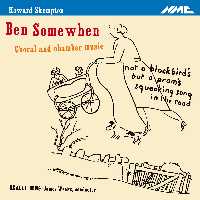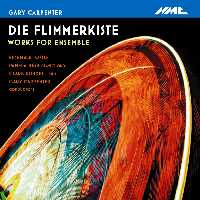|
Carpenter and Skempton 
Howard Skempton: Ben Somewhen
Birmingham Contemporary Music group; Exaudi / Weekes
NMC D135
 Gary Carpenter: Die Flimmerkiste Gary Carpenter: Die Flimmerkiste
Ensemble 10/10 / Rundell; Pamela Nash (clavichord)
NMC D111
Two releases from NMC this month, British composers as different from each other as imaginable.
The beauties of Howard Skempton's simple/simplistic little miniatures for piano and accordion having passed me by, I thought
it time to try again with these larger works. The album title Ben Somewhen was attractive, as are the graphic illustrations by Ben
Hartley, "equally reclusive" writes Skempton.
Equally reclusive as whom? Not Skempton, surely, he is much in evidence in person on the contemporary music scene, and has a loyal
following, represented here by James Weeks' introductory essay. A disciple of Cornelius Cardew, his teacher in the 60s and 70s, he
is characterised as having his roots in the British Experimental tradition. The Chamber Concerto was intended to be 'similar in
scale and character to Webern's. What emerged was 'somewhat
different'; hmm, yes indeed! The works here, for various vocal and
instrumental forces, range from six to eighteen minutes; I found
myself too imkpatient to listen right through any of them, so will
pass on the disc to one of our reviewers who is a Cardew expert...
Gary Carpenter is quite other, and I share Simon Bainbrfidge's
delight that at last there is a portrait CD of this individualist's
music, which I have enjoyed - but heard too rarely - since the
'70s. He draws on earlier music (Arcadelt and Mozart) and on the
visual arts for stimulation (Vermeer and Braque feature in his
titles here). There is a playfulness and interest in games and
Cageian chance operations, which really don't need to bother the
listener too much, because the music is ever intriguing in aural
terms and with its striking instrumentation. Carpenter is never
too serious; Bainbridge suggests Satie as the composer nearest to
his heart, with lightness and irony ever present in Carpenter's
works.
A word about an odd one out, the only piece for a solo instrument
here, that the clavichord! Carpenter won a British Clavichord
Society prize with it, and I have recently reviewed their concert
in which it was featured. Gary Carpenter tells us that he was
attracted by 'the small and evanescent sound' - - of music 'half
heard, half sensed'; one movement of his Van Assendelft's Vermeer
'more silence than sound'.
Where did he encounter it, in a concert hall?? An important
domestic instrument in the 17th/18th C, it is enjoying revival.
Dynamics are relative, and in my bedroom one finds that alternating
ff and p (e.g. in CPE Bach) can be surprisingly powerful.
Carpenter and Mermikides have chosen to record Pamela Nash at a
very low level; be warned that if you are tempted to raise it, you
risk having your ears blown out by the beginning of the following
piece.
A delightful disc, one that you will want to play more than once.
|



